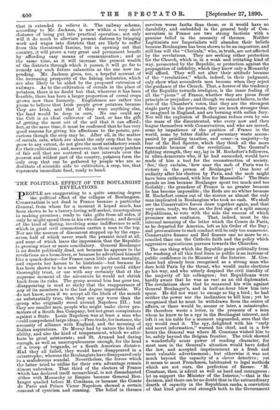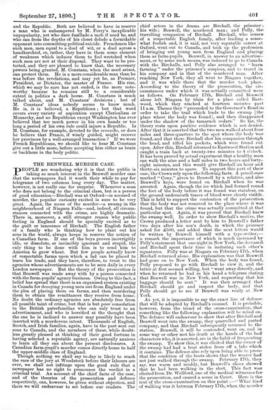IHE POLITICAL EFFECT OF THE BOITLANGIST REVELATIONS.
TEOPLE are exaggerating to a quite amazing degree the political effect of the collapse of Boulangism. Conservatism is not dead in France because a particular General, from whom for a moment it hoped much, has been shown to be a luxury-loving self-seeker, unscrupulous in making promises ; ready to take gifts from all sides, if • only he might spend them at his own discretion; and devoid of the kind of daring, involving some indifference to self, -which in great civil commotions carries a man to the top. Nor are the sources of discontent stopped up by the expo- Lures, half of which never reach the peasant mind at all, and none of which leave the impression that the Republic is growing wiser or more conciliatory. General Boulanger is no doubt politically dead, not because he appears in the revelations as a loose-liver, or because he advertised himself like a quack-doctor—for France cares little about morality, and expects her heroes to be histrionic—but because he has been shown to be a man whom no party could either thoroughly trust, or use with any certainty that at the supreme moment of the adventure he would not shrink back from its risks. The group around him has gone too, ,disappearing in mud so sticky that the reappearance of any of its members is to the last degree improbable. We do not know, even if we accept all the libels of the month ..as substantially true, that. they are any worse than the _group who originally stood around Napoleon Ill.; but • they are smaller men, people who might make clever pro- _meters of a South Sea Company, but not great conspirators against a State. Louis Napoleon was at least a man who /could comprehend large ideas,—Free-trade, for instance, the • _necessity of alliance with England, and the meaning of Italian aspirations. De Moray had by nature the kind of ability, and also the kind of temperament, which we attri- bute to great aristocrats ; and St. Arnaud had daring _enough, as well as unscrupulousness enough, for the head of a troop of brigands, or a South American dictator. Had they all failed, they would have disappeared in a catastrophe; whereas the Boulangists have disappeared only in a malodorous scandal. Nevertheless, the forces which the latter tried to utilise for their own advantage remain Almost unbroken. That third of the electors of France 'which has declared itself monarchical, is not disenchanted either with Monarchy or Empire because General Bou- langer quailed before M. Constans, or because the Comte de Paris and Prince Victor Napoleon showed a certain amount of cynicism and cunning. The belief in thrones survives worse faults than those, or it would have no durability, and embedded in the general body of Con- servatism in France are two strong factions with a genuine belief in the necessity of thrones. Neither Legitimists nor Imperialists will abandon their beliefs because Boulangism has been shown to be an imposture, and still less will the "Clericals," who, in truth, are not affected by the revelations. They are seeking either protection for the Church, which is, in a weak and irritating kind of way, persecuted by the Republic, or protection against the propagation of infidelity, which they know only a Monarchy will afford. They will not alter their attitude because of the "revelations," which, indeed, in their judgment, only show what scoundrels men become when they reject the guidance of the Church. That, a horror of the tendency of the Republic towards irreligion, is the inner feeling of all the " pious " of France, whether they are pious from' principle or prejudice ; and though we cannot believe, in the face of the Chamber's votes, that they are the strongest single party in the provinces, they are much stronger than is imagined in England, and are burning with sullen fury. Nor will the explosion of Boulangism reduce even by one the mass of the discontented, who every now and then league themselves with Conservatives, and who are moved, some by impatience of the position of France in the world, some by bitter dislike of pecuniary waste accom- panied by grinding taxation, and some—a majority—by fear of the Red Spectre, which they think all the more reasonable because of the revelations. The General's fighting strength, they say, lay in M. Rochefort's followers, in ultra-democrats who, if he had succeeded, would have made of him a tool for the reconstruction of society. See,' they exclaim, how near the mob of Paris was to victory in the person of Boulanger ! One hour of audacity after his election by Paris, and the mob might have been enthroned, with him for Masaniello.' The State spends no less because Boulanger spent too much and too foolishly ; the grandeur of France is no greater because he has become impossible ; the Reds are no whiter because M. Rochefort comes out of the stories as almost the only man implicated in Boulangism who took no cash. We shall see the Conservative forces draw together again, and that very soon, ready, we fear, on the first sign of a split among Republicans, to vote with the side the success of which promises most confusion. That, indeed, must be the internal meaning of the letter which the Comte de Paris, as he departed for America, left as his Order of the Day; and provocations to such conduct will be only too numeroue. Conservative finance and Red finance can no more be re- conciled than can the Catholic faith and the policy which aggressive agnosticism pursues towards the Churches.
The one thing which the Republic gains politically from the washing of all this foul linen in public is an increase of public confidence in its Minister of the Interior. M. Con- stans had already been recognised as a strong man who dare hold Paris by the throat, who would make elections go his way, and who utterly despised the civil timidity of the majority of his colleagues ; but Republicans were hardly aware that he was as ruse as an old diplomatist. The revelations show that he measured his wits against General Boulanger's, and in half-an-hour blew him into space. He did not want to encage so big a bird; he had neither the power nor the inclination to kill him ; yet he recognised that he must be withdrawn from the centre of affairs, or there would be, sooner or later, a catastrophe. He therefore wrote a letter, in the presence of a man whom he knew to be a spy in the Boulangist interest, and left it on his table for a moment unguarded, sure that the spy would read it. The spy, delighted with his "early and secret information," warned his chief, and in a few hours the General was where M. Constans wished him to be, safely beyond the Belgian frontier. The trick showed a wonderfully acute power of reading character, for most men in the General's situation would have defied the law, and accepted imprisonment as a fresh and most valuable advertisement; but otherwise it was not much beyond the capacity of a clever detective ; yet it seems to most Frenchmen, habituated to legal methods which are not ours, the perfection of finesse. M. Constans, then, is adroit as well as hard and courageous : let us support the Minister of the Interior,'—that is the decision, and there can be no doubt that in the extraordinary dearth of capacity in the Republican ranks, a conviction of that kind gives real strength both to the Government and the Republic. Both are believed to have in reserve a man who is unhampered by M. Ferry's inexplicable unpopularity, yet who dare fusillade a mob if need be, and who can from the depths of his closet delude a formidable opponent into committing political suicide. Frenchmen like such men, men equal to a duel of wit, or a duel across a handkerchief, or, rather, they have in them some element of weakness which induces them to feel wretched when such men are not at their disposal. They want to be pro- tected, and. they are pleased to know that, the necessary powers being granted, M. Constans, when the need arises, can protect them. He is a more considerable man than he was before the revelations, and may yet be, as Premier, President, or Dictator, the master of France. His rise, which we may be sure has not ended, is the more note- worthy because he remains still to a considerable extent in politics a dark horse. M. Constans is much talked about, and M. Constans' decisions ; but of M. Constans' ideas nobody seems to know much. He is, it is believed, a Republican ; but that word covers every variety of aspiration except Clericalism or Monarchy, and no Republican except Washington has ever believed that too much power in his own hands or too long a period of his own rule could injure a Republic. Is M. Constans, for example, devoted to the revanche, or does he believe that France, if wisely guided, might recover her provinces by a well-arranged transaction ? If we were French Republicans, we should like to hear M. Constans give out a little more, before accepting him either as brain or backbone in the body politic.



































 Previous page
Previous page